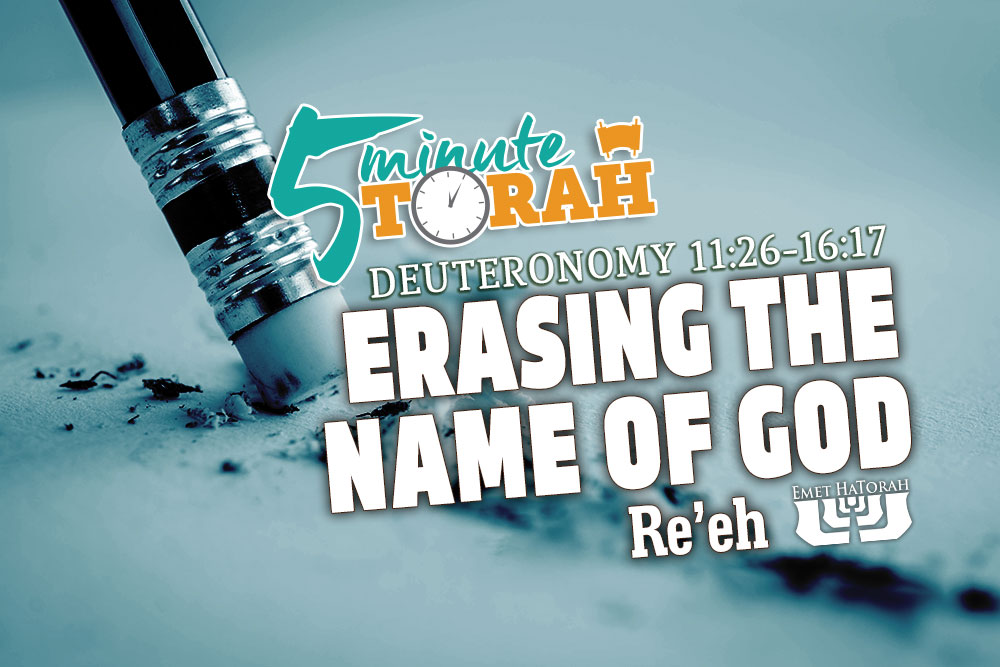Parashat Re'eh Deuteronomy 11:26-16:17
Series:

Erasing The Name
As we have seen many times previously, the Torah has many levels of understanding as well as application. This week’s portion is no exception. Toward the beginning of our reading we learn of the LORD’s command to the Israelites to obliterate the idols and the high places of the Canaanites when they enter the land given to their ancestors:
These are the statutes and rules that you shall be careful to do in the land that the LORD, the God of your fathers, has given you to possess, all the days that you live on the earth. You shall surely destroy all the places where the nations whom you shall dispossess served their gods, on the high mountains and on the hills and under every green tree. You shall tear down their altars and dash in pieces their pillars and burn their Asherim with fire. You shall chop down the carved images of their gods and destroy their name out of that place. You shall not worship the LORD your God in that way. (Deuteronomy 12:1–4)
Without an understanding that these commandments are for a specific time, a specific place, and a specific people, there are some who may think these instructions equally apply to those of us today living in the United States or other lands in the Diaspora. In their zeal against false gods, they may use these instructions to justify violent and destructive behavior against other religious depictions or practices. However, since these commandments do not have universal application but are relevant only a specific time, place, and people, how can we find any application for us today?
The first is according to the way our sages understood the last part of this passage. The last instruction in this section literally reads, “You shall not do so to the LORD your God” (Deuteronomy 12:4). Why would the Children of Israel want to do all of those things they did to the idols of Canaan to their own God? This doesn’t make sense. Therefore, the ESV and other modern translations work to smooth this out. They translate it to say something like, “You shall not worship the LORD your God in that way.” They understand it to mean that the Children of Israel must destroy the places of idol worship and not learn any pagan practices from them. But many of the sages understand this in a more literal sense and place it back into the immediate context.
The end of the previous verse (v. 3) says, “[You shall] destroy their name out of that place.” Please keep in mind that the separation of verses is a fairly modern addition to the text. Thus, these two thoughts can be read together as, “[You shall] destroy their name out of that place; you shall not worship the LORD your God in that way.” Because of this there is a prohibition against erasing, marring, or destroying the name of God. It specifically applies to the Tetragrammaton, the Divine four-letter name of the Most High, typically represented in English as Y-H-V-H.
Around the second century CE this was the common understanding. Targum Jonathan on Deuteronomy translates this verse with this explicit understanding, “Not so may you do to blot out the inscription of the Name of the Lord your God.”
This is why we do not write God’s sacred and holy Name on things that will eventually be destroyed or discarded, such as notebook paper or T-shirts. To do so would bring the most holy Name of God down to a mundane level. The Divine Name would essentially be “erased” once the item’s usefulness came to an end and was discarded.
But there is even another way we can understand this passage. There are ways by which we can blot out the Name of Hashem through our actions. How can we do so? When we act in a manner that is not fitting for people who represent the God of Abraham, Isaac, and Jacob to the world, we are reducing His Name in their eyes. In effect, we are erasing it so that they see less and less of the God we claim to represent.
We have previously discussed how our good works can help sanctify God’s name (see Matthew 5:16). But this is a way in which we can desecrate God’s name. When we do such a thing it is called chillul Hashem, or “desecrating The Name.” When we literally and physically erase God’s Name we are desecrating it; but when we live in such a way as to misrepresent or dishonor Him we are also desecrating it. Let us not blot out the Name of our God in any manner, in order that His Name may be made great in and through us in this world.








